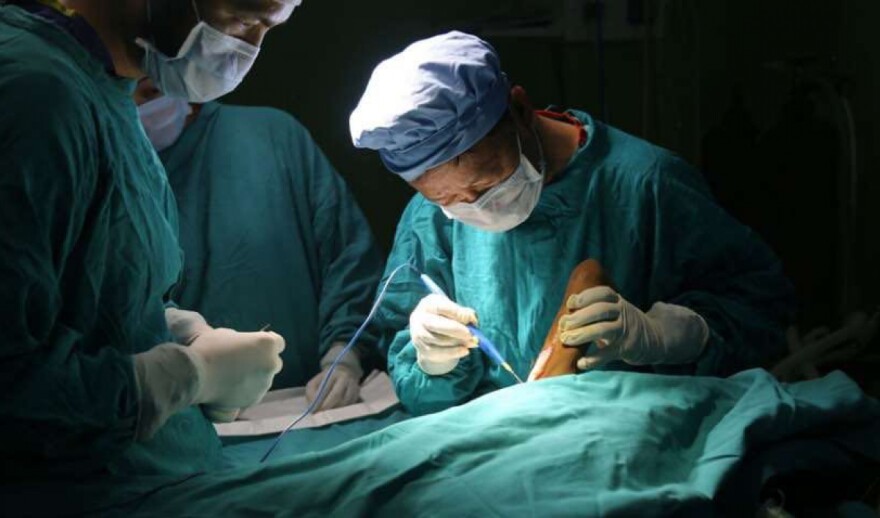Cancer. It’s a life-changing event for the people who are diagnosed and their families. Unless you have gone through the diagnosis, treatments and surgeries, it’s impossible to fully understand what patients go through.
“I have never had a serious cancer, so it’s impossible for me to try to fully empathize,” said Casey Isom, a plastic and reconstructive surgeon at Intermountain Health Care in Logan, Utah. “People are quick to jump in and try to offer advice and counsel and maybe put themselves in that patient’s shoes and use their own experiences and try to project it on the patient, but nobody knows what that patient is going through.”
But it’s not just physical pain of cancer that causes fear, it’s the thought of never seeing your friends and family again, not living to see your children or grandchildren grow up -- it’s missing out on life.
“I want them to start thinking about once the cancer is gone and the surgery is done, you’ve got the rest of your life to live with the scars and the effects of that surgery,” Isom said. “Let’s start looking ahead at a way to make you feel as good about yourself as possible and to really restore what’s been taken from you.”
“I’m from Cache Valley, I lived here my whole life,” said Pat Jensen, a former patient of Isom. “I have four daughters and 13 grandchildren and a little great-grandson recently. I like to hang out with them, they all live pretty close. The oldest daughter lives in North Salt Lake… We do have a place in St. George so we’re back in forth in St. George quite a bit, a couple of times a month and we enjoy that a lot. We’ve been on several cruises, we travel with my siblings quite a bit and go as a big group. Usually a group of about 10 or 12.”
All that was almost gone because of one gene that Pat’s family carries.
“I have carried this BRCA1 gene.”
About one in 400 people carry mutated BRCA1 or BRCA2 genes. A BRCA mutation happens when the DNA that makes up the gene becomes damaged in some way. When a BRCA gene is mutated, it’s no longer effective at repairing broken DNA or helping to prevent breast cancer.
“I have five siblings,” Jensen said. “So six of us all together and three of us got the gene, three of us had the gene and three others did not.”
Before Pat knew she carried the BRCA1 gene, others in her family had been diagnosed with breast, ovarian and colon cancer. So Pat and her family started working with the Huntsman Breast Cancer Research Program at the University of Utah 22 years ago.
“As we visited with them, they mentioned the possibility of mastectomies,” Jensen said. “So it kind of got into my head that that would be something that one day I would need to face.”
And something Pat’s daughters had to face as well. She has four daughters and three of them carry the gene.
“Back then the insurances could really ding you if you were a precursor to breast cancer and you had the gene,” Jensen said.
She was certain the researchers knew about the gene but didn’t tell her right away.
“As time went on they weren’t hanging that over your head anymore and they asked us if we would like to know,” Jensen said.
Then came the news.
“I never really worried,” Jensen said. “I thought I would rather know, then I can be very proactive. That was my thought all along, I will just be proactive with this and do the things that I can to prevent it. That would be a hysterectomy, yearly exam, colonoscopies, I was just very regimented and I kept up with all of that.”
But when it came to breast reconstructive surgery, Pat’s daughters went first.
“When they had their last babies they decided that they would go ahead and do this as preventative,” Jensen said. “So they had both had the double mastectomy and reconstruction. They look at me and say, ‘Okay mom you’re the one that passed it on. It’s time for you to do this!’ That’s what I decided to do.”
Pat was nervous, but the surgery and the timing paid off.
“I was showing tissue that was getting ready to turn into breast cancer,” Jensen said. “That was very nice to hear that I went ahead and made that decision and it turned out that it was a good thing.”
Watching her children have families, spoiling grandchildren and going on cruises could have ended.
“I had an aunt die of colon cancer, my own mother passed away of ovarian and many cousins that we were fighting really bad breast cancer and several that had passed away,” Jensen said.
What kept Pat so regimented for 22 years? Family.
“Oh, it’s everything, everything to me. I don’t enjoy being away from them very long,” Jensen said. “I always tend to be wondering what they’re doing, I don’t want to miss out on the things that they’re doing.”
Support for Diagnosed has been provided in part by our members and Intermountain Budge Clinic, a multi-specialty clinic offering care for every member of your family in one location. Details found here.


